#source: brandon sanderson
Explore tagged Tumblr posts
Text


Gonta: You have an odd sense of morality, Maki. Maki: Don't be stupid, every sense of morality is odd.
Source: Brandon Sanderson (The Stormlight Archive, “Words of Radiance”)
#danganronpa#incorrect quotes#drv3#gonta gokuhara#maki harukawa#source: the stormlight archive#source: brandon sanderson
46 notes
·
View notes
Text
WHO IS COOKED 🗣️ 🔥 🔥 ‼️ 🧑🍳 🔥
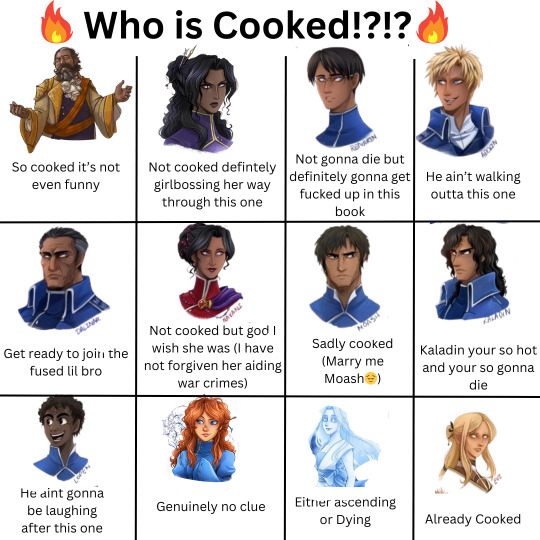
#this is completely vibes based analysis#there is no evidence#my source? a woman’s intuition#my source? I have none#my source? I’m lying#my source? it came to me in a vision#no one is making it outta wind and truth#cosmere#stormlight archive#brandon sanderson#the stormlight archive#kaladin stormblessed#cosmere memes#cremposting#dalinar kholin#jasnah kholin#elhokar kholin#navani kholin#renarin kholin#adolin kholin#evi kholin#lopen#the lopen#Lopen stormlight#fuck moash 🥵#moash stormlight#Moash#sebariel#turinad sebariel#shallan davar
168 notes
·
View notes
Text
Prof: Reading can be sexy.
Tia: Maybe naked.
#the reckoners#incorrect reckoners quotes#prof#tia redwin#professor jonathan phaedrus#jonathan phaedrus#source: ac odyssey#brandon sanderson
7 notes
·
View notes
Text
Stormlight Archive Characters and the Modern name I think they’d have
(Btw, im focusing on American/Western/ykwim names)
Adolin: Aaron (reason: the meaning is close to Adolin’s own, it’s meaning in Strong's Hebrew Lexicon being"Light-bringer", and the fact they have generally similar structure.)
Kaladin: Kayson/Callum (Reason: Kayson has a similar nickname format to Kal, being Kay. It also means “healer”, and i thought that was nice. Callum being a secondary option, more for the fact the nickname is identical, is also just generally a name i see Kal having.(Also it’s loosely based off of Saint. Columba, and the direct meaning is “dove”, which is a symbol of the Holy Spirit, and i think it fits Kal’s character to be named after a saint and a big religious thing, with his name being “born unto eternity”)
Shallan: Primrose/Lilias (reason: while Shallan’s name doesnt currently have a canon meaning besides being derivative of Shalash, it’s actual meaning as a name means “Poppy Flower” and because i didn’t feel like Poppy fit Shallan, i found names that matched Shallan’s energy and general meaning, taking ‘flower’ instead of ‘poppy.’ Lilias is a Scottish name— my own personal HC of where she would be from, or at least her ancestry— and fits Shallan’s name of having two consonants on either side of her name and the middle being symmetrical. Primrose was just a general vibe pick)
Dalinar: Dallas (Reason: Dalinar also has no confirmed names, its similar to Brandon’s son’s name, Dallin. That name means “from the valley”, so I looked at names with the same/similar meanings. Also vibes, and the fact Dallas is a city, and Dalinar sounds similar/has the same last letters as Kholinar)
Renarin: Raziel (reason: because there are NO good R names. No but this one was tough. Renarin’s name doesnt really mean anything i could translate into like an irl name, so i just went through all R names. This name kinda has the same feel as Renarin’s must in Roshar, being generally adherent to naming standards while sounding out of place. Also, in the Jewish Kabbalah, Raziel is an angel known as “The Keeper of Secrets.” So, (Spoilers?) pass at Sja-Anat and stuff)
#thats as much as i care to do rn#stormlight archive#cosmere#the stormlight archive#brandon sanderson#kaladin stormblessed#dalinar kholin#adolin kholin#renarin kholin#shallan davar#i am PROBABLY wrong abt some of the name meanings and Jewish texts and stuff#i get my source from the internet pls
24 notes
·
View notes
Text
why does it matter so much what language are you reading a story in, it should be the same story!! but it does, oh it does.
#tumblr kept raving on about how pretty the prose in Autoboyography is and I didn't understand because it was really nothing special to me#but now I'm finding quotes in English and hello??? this is so pretty and poetic and it sounds so good#but I read it in Hungarian and now I'm mad at missing out on this#the story was still touching and the pacing good but the phrasing is just so much better in the original#and I was noticing things that made me go even while reading huh this translation isn't very good now is it#but it matter this much??? ahhh#will I just have to read all books on its source language now?#also I always wonder about the role of my personal interpretation and perception of reading things in different languages#based on like. I'm more detached in English so uncomfortable topics and expressing emotions are easier to tackle like that#but then I'd expect that romance hits harder in my native language because it has the power to deliver the emotions better#was it just the bad translation or is this something?#in this phd proposition I will. . .#anyway the book is about a queer not-mormon and a not-queer mormon falling in love on brandon sanderson's writing class.#would recommend it was very interesting#miaing
7 notes
·
View notes
Text
Wait actually…that’s a good point. The person asking the question definitely intended “crazy cat lady” because they were talking about their love of cats in the lead up. But that doesn’t mean Sanderson answered it that way…
There’s a crazy cat lady in the Cosmere. We’ve not met her yet, but Sanderson says we’ll know her when we see her
#this info was sourced from my own ears#it’s the Q&A portion of the WaT release at Dragonsteel Nexus#I know it was live-streamed but idk if it’s still viewable somewhere#otherwise 17th shard will have the transcription up soon if not already#brandon sanderson#cosmere#dragonsteel nexus 2024#dragonsteel nexus
115 notes
·
View notes
Text
Brandon Sanderson on why TV adaptations of fantasy works end up being so different to the source material:
I have a fun story here. Early in my career, someone optioned the rights to make one of my stories (the Emperor's Soul) into a film. I was ecstatic, as it's not a story that at the time had gotten a lot of attention from Hollywood. I met with the writer, who had a good pedigree, and who seemed extremely excited about the project; turned out, he'd been the one to persuade the production company to go for the option. All seemed really promising. A year or so later, I read his script and it was one of the most bizarre experiences of my life. The character names were, largely, the same, though nothing that happened to them was remotely similar to the story. Emperor's Soul is a small-scale character drama that takes place largely in one room, with discussions of the nature of art between two characters who approach the idea differently. The screenplay detailed an expansive fantasy epic with a new love interest for the main character (a pirate captain.) They globe-trotted, they fought monsters, they explored a world largely unrelated to mine, save for a few words here and there. It was then that I realized what was going on. Hollywood doesn't buy spec scripts (original ideas) from screenwriters very often, and they NEVER buy spec scripts that are epic fantasy. Those are too big, too expensive, and too daunting: they are the sorts of stories where the producers and executives need the proof of an established book series to justify the production. So this writer never had a chance to tell his own epic fantasy story, though he wanted to. Instead, he found a popularish story that nobody had snatched up, and used it as a means to tell the story he'd always wanted to tell, because he'd never otherwise have a chance of getting it made. I'm convinced this is part of the issue with some of these adaptations; screenwriters and directors are creative, and want to tell their own stories, but it's almost impossible to get those made in things like the fantasy genre unless you're a huge established name like Cameron. I'm not saying they all do this deliberately, as that screenwriter did for my work, but I think it's an unconscious influence. They want to tell their stories, and this is the allowed method, so when given the chance at freedom they go off the rails, and the execs don't know the genre or property well enough to understand why this can lead to disaster. Anyway, sorry for the novel length post in a meme thread. I just find the entire situation to be fascinating.
#Brandon Sanderson#The Wheel of Time#A Song of Ice and Fire#George R R Martin#WOT#asoiaf#HOTD#GRRM#Game of Thrones#GOT
659 notes
·
View notes
Text
Henry Cavill called Brandon Sanderson and asked to play Kaladin and asked if he was too old for the role and Brandon flat out told him: Yes, you're too old for the role and also Kaladin is Asian.
Source
#henry cavill there is no role for you in stormlight#there are no white people on roshar except for the shin#and you can't play szeth#i'm sorry you don't have szeth vibes#stormlight archive#brandon sanderson#henry cavill
559 notes
·
View notes
Text

Rantaro: Maybe I'll remove dying from my list of tasks to do this week.
Source: Brandon Sanderson (The Stormlight Archive, “The Way of Kings”)
#incorrect quotes#danganronpa#drv3#rantaro amami#source: brandon sanderson#source: the stormlight archive
87 notes
·
View notes
Text
"The subtext that undergirds this new anti-racist discourse—that Black-white relationships are inherently fraught and must be navigated with the help of professionals and technical experts—testifies to the impoverishment of our interracial imagination, not to its enrichment. More gravely, anti-color-blind etiquette treats Black Americans as exotic others, permanent strangers whose racial difference is so chasmic that it must be continually managed, whose mode of humanness is so foreign that it requires white people to adopt a special set of manners and 'race conscious' ritualistic practices to even have a simple conversation."*
*(emphasis mine)
By: Tyler Austin Harper
Published: Aug 14, 2023
The hotel was soulless, like all conference hotels. I had arrived a few hours before check-in, hoping to drop off my bags before I met a friend for lunch. The employees were clearly frazzled, overwhelmed by the sudden influx of several hundred impatient academics. When I asked where I could put my luggage, the guy at the front desk simply pointed to a nearby hallway. “Wait over there with her; he’s coming back.”
Who “he” was remained unclear, but I saw the woman he was referring to. She was white and about my age. She had a conference badge and a large suitcase that she was rolling back and forth in obvious exasperation. “Been waiting long?” I asked, taking up a position on the other side of the narrow hallway. “Very,” she replied. For a while, we stood in silence, minding our phones. Eventually, we began chatting.
The conversation was wide-ranging: the papers we were presenting, the bad A/V at the hotel, our favorite things to do in the city. At some point, we began talking about our jobs. She told me that—like so many academics—she was juggling a temporary teaching gig while also looking for a tenure-track position.
“It’s hard,” she said, “too many classes, too many students, too many papers to grade. No time for your own work. Barely any time to apply to real jobs.”
When I nodded sympathetically, she asked about my job and whether it was tenure-track. I admitted, a little sheepishly, that it was.
“I’d love to teach at a small college like that,” she said. “I feel like none of my students wants to learn. It’s exhausting.”
Then, out of nowhere, she said something that caught me completely off guard: “But I shouldn’t be complaining to you about this. I know how hard BIPOC faculty have it. You’re the last person I should be whining to.”
I was taken aback, but I shouldn’t have been. It was the kind of awkward comment I’ve grown used to over the past few years, as “anti-racism” has become the reigning ideology of progressive political culture. Until recently, calling attention to a stranger’s race in such a way would have been considered a social faux pas. That she made the remark without thinking twice—a remark, it should be noted, that assumes being a Black tenure-track professor is worse than being a marginally employed white one—shows how profoundly interracial social etiquette has changed since 2020’s “summer of racial reckoning.” That’s when anti-racism—focused on combating “color-blindness” in both policy and personal conduct—grabbed ahold of the liberal mainstream.
Though this “reckoning” brought increased public attention to the deep embeddedness of racism in supposedly color-blind American institutions, it also made instant celebrities of a number of race experts and “diversity, equity, and inclusion” (DEI) consultants who believe that being anti-racist means undergoing a “journey” of radical personal transformation. In their righteous crusade against the bad color-blindness of policies such as race-neutral college admissions, these contemporary anti-racists have also jettisoned the kind of good color-blindness that holds that we are more than our race, and that we should conduct our social life according to that idealized principle. Rather than balance a critique of color-blind law and policy with a continuing embrace of interpersonal color-blindness as a social etiquette, contemporary anti-racists throw the baby out with the bathwater. In place of the old color-blind ideal, they have foisted upon well-meaning white liberals a successor social etiquette predicated on the necessity of foregrounding racial difference rather than minimizing it.
As a Black guy who grew up in a politically purple area—where being a good person meant adhering to the kind of civil-rights-era color-blindness that is now passé—I find this emergent anti-racist culture jarring. Many of my liberal friends and acquaintances now seem to believe that being a good person means constantly reminding Black people that you are aware of their Blackness. Difference, no longer to be politely ignored, is insisted upon at all times under the guise of acknowledging “positionality.” Though I am rarely made to feel excessively aware of my race when hanging out with more conservative friends or visiting my hometown, in the more liberal social circles in which I typically travel, my race is constantly invoked—“acknowledged” and “centered”—by well-intentioned anti-racist “allies.”
This “acknowledgement” tends to take one of two forms. The first is the song and dance in which white people not-so-subtly let you know that they know that race and racism exist. This includes finding ways to interject discussion of some (bad) news item about race or racism into casual conversation, apologizing for having problems while white (“You’re the last person I should be whining to”), or inversely, offering “support” by attributing any normal human problem you have to racism.
The second way good white liberals often “center” racial difference in everyday interactions with minorities is by trying, always clumsily, to ensure that their “marginalized” friends and familiars are “culturally” comfortable. My favorite personal experiences of this include an acquaintance who invariably steers dinner or lunch meetups to Black-owned restaurants, and the time that a friend of a friend invited me over to go swimming in their pool before apologizing for assuming that I know how to swim (“I know that’s a culturally specific thing”). It is a peculiar quirk of the 2020s’ racial discourse that this kind of “acknowledgement” and “centering” is viewed as progress.
My point is not that conservatives have better racial politics—they do not—but rather that something about current progressive racial discourse has become warped and distorted. The anti-racist culture that is ascendant seems to me to have little to do with combatting structural racism or cultivating better relationships between white and Black Americans. And its rejection of color-blindness as a social ethos is not a new frontier of radical political action.
No, at the core of today’s anti-racism is little more than a vibe shift—a soft matrix of conciliatory gestures and hip phraseology that give adherents the feeling that there has been a cultural change, when in fact we have merely put carpet over the rotting floorboards. Although this push to center rather than sidestep racial difference in our interpersonal relationships comes from a good place, it tends to rest on a troubling, even racist subtext: that white and Black Americans are so radically different that interracial relationships require careful management, constant eggshell-walking, and even expert guidance from professional anti-racists. Rather than producing racial harmony, this new ethos frequently has the opposite effect, making white-Black interactions stressful, unpleasant, or, perhaps most often, simply weird.
Since the murder of George Floyd in May 2020, progressive anti-racism has centered on two concepts that helped Americans make sense of his senseless death: “structural racism” and “implicit bias.” The first of these is a sociopolitical concept that highlights how certain institutions—maternity wards, police barracks, lending companies, housing authorities, etc.—produce and replicate racial inequalities, such as the disproportionate killing of Black men by the cops. The second is a psychologicalconcept that describes the way that all individuals—from bleeding-heart liberals to murderers such as Derek Chauvin—harbor varying degrees of subconscious racial prejudice.
Though “structural racism” and “implicit bias” target different scales of the social order—institutions on the one hand, individuals on the other—underlying both of these ideas is a critique of so-called color-blind ideology, or what the sociologist Eduardo Bonilla-Silva calls “color-blind racism”: the idea that policies, interactions, and rhetoric can be explicitly race-neutral but implicitly racist. As concepts, both “structural racism” and “implicit bias” rest on the presupposition that racism is an enduring feature of institutional and social life, and that so-called race neutrality is a covertly racist myth that perpetuates inequality. Some anti-racist scholars such as Uma Mazyck Jayakumar and Ibram X. Kendi have put this even more bluntly: “‘Race neutral’ is the new “separate but equal.’” Yet, although anti-racist academics and activists are right to argue that race-neutral policies can’t solve racial inequities—that supposedly color-blind laws and policies are often anything but—over the past few years, this line of criticism has also been bizarrely extended to color-blindness as a personal ethos governing behavior at the individual level.
The most famous proponent of dismantling color-blindness in everyday interactions is Robin DiAngelo, who has made an entire (very condescending) career out of asserting that if white people are not uncomfortable, anti-racism is not happening. “White comfort maintains the racial status quo, so discomfort is necessary and important,” the corporate anti-racist guru advises. Over the past three years, this kind of anti-color-blind, pro-discomfort rhetoric has become the norm in anti-racist discourse. On the final day of the 28-day challenge in Layla Saad’s viral Me and White Supremacy, budding anti-racists are tasked with taking “out-of-your-comfort-zone actions,” such as apologizing to people of color in their life and having “uncomfortable conversations.” Frederick Joseph’s best-selling book The Black Friend takes a similar tack. The problem with color-blindness, Joseph counsels, is it allows “white people to continue to be comfortable.” The NFL analyst Emmanuel Acho wrote an entire book, simply called Uncomfortable Conversations With a Black Man, that admonishes readers to “stop celebrating color-blindness.” And, of course, there are endless how-to guides for having these “uncomfortable conversations” with your Black friends.
Once the dominant progressive ideology, professing “I don’t see color” is now viewed as a kind of dog whistle that papers over implicit bias. Instead, current anti-racist wisdom holds that we must acknowledge racial difference in our interactions with others, rather than assume that race needn’t be at the center of every interracial conversation or encounter. Coming to grips with the transition we have undergone over the past decade—color-blind etiquette’s swing from de rigueur to racist—requires a longer view of an American cultural transition. Civil-rights-era color-blindness was replaced with an individualistic, corporatized anti-racism, one focused on the purification of white psyches through racial discomfort, guilt, and “doing the work” as a road to self-improvement.
Writing in 1959, the social critic Philip Rieff argued that postwar America was transforming from a religious and economic culture—one oriented around common institutions such as the church and the market—to a psychological culture, one oriented around the self and its emotional fulfillment. By the 1960s, Rieff had given this shift a name: “the triumph of the therapeutic,” which he defined as an emergent worldview according to which the “self, improved, is the ultimate concern of modern culture.” Yet, even as he diagnosed our culture with self-obsession, Rieff also noticed something peculiar and even paradoxical. Therapeutic culture demanded that we reflect our self-actualization outward. Sharing our innermost selves with the world—good, bad, and ugly—became a new social mandate under the guise that authenticity and open self-expression are necessary for social cohesion.
Recent anti-racist mantras like “White silence is violence” reflect this same sentiment: exhibitionist displays of “racist” guilt are viewed as a necessary precursor to racial healing and community building. In this way, today’s attacks on interpersonal color-blindness—and progressives’ growing fixation on implicit bias, public confession, and race-conscious social etiquette—are only the most recent manifestations of the cultural shift Rieff described. Indeed, the seeds of the current backlash against color-blindness began decades ago, with the application of a New Age, therapeutic outlook to race relations: so-called racial-sensitivity training, the forefather of today’s equally spurious DEI programming.
In her 2001 book, Race Experts, the historian Elisabeth Lasch-Quinn painstakingly details how racial-sensitivity training emerged from the 1960s’ human-potential movement and its infamous “encounter groups.” As she explains, what began as a more or less countercultural phenomenon was later corporatized in the form of the anemic, pointless workshops controversially lampooned on The Office. Not surprisingly, this shift reflected the ebb and flow of corporate interests: Whereas early workplace training emphasized compliance with the newly minted Civil Rights Act of 1964, later incarnations would focus on improving employee relations and, later still, leveraging diversity to secure better business outcomes.
If there is something distinctive about the anti-color-blind racial etiquette that has emerged since George Floyd’s death, it is that these sites of encounter have shifted from official institutional spaces to more intimate ones where white people and minorities interact as friends, neighbors, colleagues, and acquaintances. Racial-awareness raising is a dynamic no longer quarantined to formalized, compulsory settings like the boardroom or freshman orientation. Instead, every interracial interaction is a potential scene of (one-way) racial edification and supplication, encounters in which good white liberals are expected to be transparent about their “positionality,” confront their “whiteness,” and—if the situation calls for it—confess their “implicit bias.”
In a vacuum, many of the prescriptions advocated by the anti-color-blind crowd are reasonable: We should all think more about our privileges and our place in the world. An uncomfortable conversation or an honest look in the mirror can be precursors to personal growth. We all carry around harmful, implicit biases and we do need to examine the subconscious assumptions and prejudices that underlie the actions we take and the things we say. My objection is not to these ideas themselves, which are sensible enough. No, my objection is that anti-racism offers little more than a Marie Kondo–ism for the white soul, promising to declutter racial baggage and clear a way to white fulfillment without doing anything meaningful to combat structural racism. As Lasch-Quinn correctly foresaw, “Casting interracial problems as issues of etiquette [puts] a premium on superficial symbols of good intentions and good motivations as well as on style and appearance rather than on the substance of change.”
Yet the problem with the therapeutics of contemporary anti-racism is not just that they are politically sterile. When anti-color-blindness and its ideology of insistent “race consciousness” are translated into the sphere of private life—to the domain of friendships, block parties, and backyard barbecues—they assault the very idea of a multiracial society, producing new forms of racism in the process. The fact that our media environment is inundated with an endless stream of books, articles, and social-media tutorials that promise to teach white people how to simply interact with the Black people in their life is not a sign of anti-racist progress, but of profound regression.
The subtext that undergirds this new anti-racist discourse—that Black-white relationships are inherently fraught and must be navigated with the help of professionals and technical experts—testifies to the impoverishment of our interracial imagination, not to its enrichment. More gravely, anti-color-blind etiquette treats Black Americans as exotic others, permanent strangers whose racial difference is so chasmic that it must be continually managed, whose mode of humanness is so foreign that it requires white people to adopt a special set of manners and “race conscious” ritualistic practices to even have a simple conversation.
If we are going to find a way out of the racial discord that has defined American life post-Trump and post-Charlottesville and post-Floyd, we have to begin with a more sophisticated understanding of color-blindness, one that rejects the bad color-blindness on offer from the Republican Party and its partisans, as well as the anti-color-blindness of the anti-racist consultants. Instead, we should embrace the good color-blindness of not too long ago. At the heart of that color-blindness was a radical claim, one imperfectly realized but perfect as an ideal: that despite the weight of a racist past that isn’t even past, we can imagine a world, or at least an interaction between two people, where racial difference doesn’t make a difference.
[ Via: https://archive.today/8zfvc ]
#found this while looking for something else entirely#touches on several ideas ive been percolating on recently in a super interesting relevant way#dovetails with some conversations ive been having with white friends and in therapy as well#really glad i found it#ive been thinking about the theory of like a propensity for overcorrection as part of the work of unlearning and deconstructing#speaking both toward unlearning and deconstructing white supremacy culture but also maladaptive coping mechanisms wrt spiritual healing#and its because the more i learn and read and think about it the more i am starting to think of the two concepts as basically linked#not to get fake deep or anything but i do think it is all connected#whiteness and supremacy culture and capitalism .. all of it alienates us systematically from our communities and like. spiritual wellbeing#its the syllabus for individualism perfectionism right to comfort urgency defensiveness black and white reasoning etc#and is that not literally all the same shit we're all paying thousands of dollars to exhume in years of therapy?#idk man it seems to me like every time i turn over a rock in my healing journey wsc is down there underneath everything else#just like blackrock and vanguard you trace your micro-issue far enough back to the source and behind all the shell corps there it is#it feels almost fantastically reductive like imagine reality being like a brandon sanderson novel with exactly one Big Bad#to fight at the end of every book and maybe finally vanquish by the end of the series#like im trying to be critical of the impulse to over simplify an objectively complicated and nuanced issue#the last thing i want is to cast something as convoluted and deeply violent and traumatising as this in a reductive light#and am trying to navigate this idea without framing white people as the 'real' or 'unsung' victims of wsc#because that certainly is not the case or the argument#this just is a theme that keeps cropping up in my conversations and thoughts about both concepts#something to chew on journal about etc#i have so many more thoughts about this branching off in so many directions but this is not the place for that all though . lol#overcorrection#note to self#angie.txt
12 notes
·
View notes
Text
Ranking Various Cosmere Fantasy Swears
If there's one thing Brandon Sanderson likes, it's avoiding any real swear words in favor of Fantasy Swears. I am genuinely a huge fan of this technique. So here how I'd rank some of the ones I can remember! (And thanks to 17th Shard [here and here] and to Reddit for compiling some lists!).
#14: Colors (Warbreaker)
This one feels a little bit...lazy, I guess? Like yes, Warbreaker's magic is color-dependent, so colors are a big part of the world-building, so I guess it makes sense that people use it as a swear. But it feels like if, in fantasy USA, people swore by "eagles" all the time: "Eagles! I dropped my hamburger!"
#13: Moons (Tress of the Emerald Sea)
I mean same problem as with "colors"! Yes, the moons are a big aspect of the worldbuilding, but it just feels like a semi-boring swear. Although maybe that's just the swear that Tress tends to use.
#12: Shadows/Shades (Shadows for Silence/Sunlit Man)
Okay, maybe this one is a bit boring, but anything Threndy-related gets extra credit from me. So therefore I think this is one of the least boring of the "basically boring descriptors of world building elements" swears.
#11: By the Lord Ruler (Mistborn)
I mean...eh. This one is world specific, but it's basically like swearing by god only in this case the god is the Lord Ruler, right? It makes sense 'n' all but isn't as interesting as some of the later ones.
#10: By the Survivor's Scars (Mistborn)
This one is better because it's more specific--Kelsier's scars are rich with meaning, and swearing by them does feel like it carries cultural weight.
#9: By Harmony's Armbands (Mistborn)
Putting them all in a line like this...I just like how they get ever more specific. Now we're swearing by Harmony's feruchemical armlets? Okay!
#8: God Beyond (Shadows for Silence)
I mean, Threnody is, like, haunted by a god's corpse, so I think any of their god-related swears are more interesting as a result.
#7: Nights / Nights afire (Emperor's Soul)
I like this one because I just don't know what it refers to and it seems kinda creepy. What are nights on fire for??
#6: Rust and Ruin (Mistborn)
Frankly, the alliteration gets this one extra points. And "Rust and Ruin!" just feels like a good thing to shout when you've stubbed your toe.
#5: Storms/storming/Stormfather (Stormlight Archive)
I know this one SHOULD lose points for being exactly the sort of boring descriptive swear I maligned above...but I enjoy this one simply because it's such a clear linguistic stand-in for "fuck" and that leads to such amusing translations as "Kaladin Fuckblessed" or the "Fuckfather" and that just never stops being funny to me.
#4: Herald body parts (Stormlight Archive)
I didn't notice until looking at various compiled lists of Cosmere Fantasy Swears, but Rosharans really like to swear by specific Herald body parts, huh? From here: Kelek's breadth, Kelek's tongue, Ash's eyes, Ishar's soul, Nalan's hand, Pali's mind, Talat's hand...I'm a fan of this. It's interesting and feels culturally relevant.
#3: Glories Within (Stormlight Archive)
This one is just Szeth so far, but people speculate it's probably a Shin curse. That makes it interesting to me since we don't know a whole lot about the Shin. What inner glory are they using to swear?
#2: Starving (Stormlight Archive)
This one is pretty similar to "Storming," I suppose, in being a pretty clear linguistic stand-in for "fucking." But I just like that the food-obsessed Lift has her own personal swear relating to starvation.
#1: Lowly/Highly (Yumi and the Nightmare Painter)
I'm a big fan of the lowly/highly thing from Yumi & the Nightmare Painter, where words can be linguistically marked as meant in either a high way (complimentary) or a low way (insultingly). It's fun worldbuilding and leads to some comic beats in the novel. Plus, this post tickled me greatly: https://www.tumblr.com/cabinetcreature/722030379790401536?source=share. It's so true!
#cosmere#cosmerelists#Stormlight Archive#Warbreaker#Mistborn#Sunlit Man#Tress of the Emerald Sea#Yumi and the Nightmare Painter#Shadows for Silence#Emperor's Soul
325 notes
·
View notes
Text
Jelloapocaylpse and One Piece
So, there's this thought I've been having about gigantic franchises: any criticism against them needs to be taken with two specific grains of salt. First, people who dislike the franchise will be more annoyed by its flaws because of overexposure, and second, reactions to these criticisms will be overblown because there's so many more fans. I'm of the opinion that you shouldn't respond to criticisms of your favorite things if they're enormously popular, meaning I'll be more silent on negative reviews of things like Critical Role, One Piece and Brandon Sanderson's works than I would be for smaller things like Wayward Children, Grimm or The Craft Sequence.
But when these two grains of salt come together? Oh, boy. OOOOOOOH boy.
I love So This is Basically..., and have since I discovered the channel. A good chunk of my humor comes from the jokes in those videos, and even for something like Kingdom Hearts where it's negative, I still enjoy both the video and the franchise, so I've elected to let it be. But in his recent video on One Piece, while it was funny he got so many things seriously wrong about the series that I've struggled with whether or not to say something about it. I think the artistry on display in the video can get drowned out by the negativity being poured into it, and while I don't have much of a platform I can yell into the void like the best of them, and it's bothering me enough that I want to lay some things out.
So, for your discretion: a time-stamped review of Jelloapocaylpse's So This is Basically One Piece. I will endeavor to only time-stamp things I found wrong about the series. I understand jokes aren't meant to be taken seriously, but I think humor is revealing, and if we can dissect the jokes of the anti-woke crowd to find the ugly truth within, we can do the same to ourselves. And if I can shout out a more complicated thought about One Piece from a joke then I will, and even point out moments where Jello is right.
I will not talk about Brendan Blaber's personal life nor his anime work. I am aware of what happened with Lovely★Complex but find it immaterial to the video on his YouTube channel. Perhaps his motivations were dishonest, and that could explain his rampant dislike of the source material; at this time, I don't think it factors in, but if I'm proven wrong I will make an edit with the proper updated information. And, per a beef I have with the video itself, I also want to stress that you should not harass nor send death threats to people you dislike, especially about a piece of media. THIS INCLUDES ASSHOLES.
With that, let's begin. Video is included so you can follow along. There will be spoilers freely discussed; be forewarned. If I am wrong, chime in and correct me; I am not above mistakes.
youtube
0:08: This is a fun callback to the 4Kids dub of One Piece, which is widely reviled but for some small moments of genius.
0:11: an out-of-context, raving explanation of the worldbuilding, which is entirely correct.
0:38: Incorrect. The Grand Line is specifically written to be hard to get into and out of unless you have the tech for it. This is a big deal in both the manga and the anime and I don't know why/how he missed this.
0:50: This is a fan theory. I was willing to accept it but googling it turned out it wasn't correct. The following jokes require this to be true, however, so creative license applies.
1:06: Arguably true, and I say that because, while each of these characters technically has a different power, they're all used to manipulate the environment and stone like it's water. That's a thing and a theme in the series; Luffy even gets to fight Charlotte Katakuri, who has a similar Devil Fruit. Call it lazy, call it creative, it's debatable, and funny.
1:11-1:38: the following explanation is also true, but insulting. The boundaries between each Devil Fruit are more fluid than the initial system lets on, true, but as in real life aggressive categorization is usually incorrect and uninteresting.
1:43: The description of the fights applies less to One Piece than Shounen as a whole. You could be uncharitable and say it describes all fights, but I will restrain myself. A lot of fights do have an element of unpredictability to them; sometimes it's the randomness that feels realistic and other times it's Deus Ex Machina. You could argue the fights are more about the philosophical difference between the two (Sanji vs Wanze comes to mind) but it makes for long, drawn-out fights. I think most of the pacing problems come from the anime but I've been annoyed by the manga as well.
1:55: It is true that Robin doesn't get many fights, which is disappointing as a Robin fan. And I won't deny that sexism pervades the writing of One Piece when it runs unchecked. But I don't think the two are related; Robin's fights tend to be brutal and fast, and she deals more with grunts than generals. The exception is Robin vs Black Maria, which was Very Good.
But her focus in the story is less on fighting and more about archeology and history, and in that case she often reshapes the way we see the world with her investigations. Fighting ain't all there is to a Shounen series, and the wise reader remembers this. (this point copied wholesale from Anthony Gramuglia)
Obligatory "Yes One Piece is very long and I hope it ends well".
2:02: The espionage episodes are quite good. But I think this conclusion draws from the dislike of the adventure and action, so you need to agree with the first to reach the second, and I do not.
2:08: I had not realized how many islands were circles in One Piece so that criticism applies even if it doesn't mean anything for the quality of the series. But Punk Hazard isn't about stopping Smiley (who barely features) and I would argue that "natural disaster" doesn't apply to some of the threats the crew faces, and it's definitely not every arc.
2:24: only Punk Hazard was (half) on fire. Fires do happen a lot as a way to push tension but the arcs were flattened to make this point.
2:30: "from the jungle" is the best joke in this episode.
2:37: "Hit 'em with the poison that doesn't work!" happens a lot as well. It is often because the characters have to figure out a way around it, like other protagonists do during Good Fights.
2:46: This is a weird take. I know Zoro is an asshole but sexism was something he hated in his childhood and that disdain forms a big part of his personality. You could also call him Minority Hunter like the fanbase does, given he fights mostly black people.
2:52: Nami's not gay in the series, not explicitly, anyways. Alas.
2:56: God, to be a Sanji fan is to suffer. He has some of the best and worst moments in the series and the live-action series made him a bajillion times better.
3:15: good follow-up on a joke with a bad setup.
3:16: I'm annoyed Franky was removed from this. He's a lot of fun. And I'm also annoyed that you talk about Sanji's perversions but don't bring up Brook who is arguably worse in every way. These as well as Chopper and Jinbe get flattened for the sake of this video, and considering Chopper is my favorite Straw Hat this very much annoys me.
But he does make a point about these characters: Robin through Franky don't get to do as much throughout the series. They're often rendered as side characters who react to things instead of having their own arcs. For all that Thriller Bark was Not Great, Chopper was given an arc that ties very directly into who he is, and I'm saddened we didn't get something like that again until Wano.
3:21: The characters have personality, it is just now shown in this video. Usopp is not given a description and Nami is summarized as "lesbian" with nothing else of their character depths.
3:26: again, the best joke is the jungle joke.
3:39: I am not certain we're supposed to like Aokiji. He does some pretty heinous things throughout the series. Garp is a more-interesting case, in that his loyalty to the World Government is treated as his greatest flaw, but he's also an asshole. It's almost like he's a very complicated character or something.
3:47: This is the part that I kept coming back to, the part that's most insulting. I am bad with names so I admit I had to google this fish-man's name, but his name is Macro, he was a member of the Sun Pirates and he didn't keep slaves. The Sun Pirates especially freed any and all slaves they came across because they were also enslaved. Arlong did keep slaves but he was not enslaved himself, and the continuing stain of racism and slavery washes out over the rest of the series itself almost as if it were good or something. Out of all the things to get wrong, this one was the most egregious.
4:00: The Marineford arc was VERY LONG. A lot of stuff happened and it affected the pace quite a bit. The dig at the author is unwarranted.
4:07: FROM THE JUNGLE BA-
4:15: I'm torn on this complaint. On the one hand, subtle foreshadowing is usually the way to go when it comes to announcing what is going to happen. On the other hand, you can easily forget a lot of things that happen in a single narrative so sometimes twists come out of nowhere.
However! This complaint is mitigated by the fact that the series will readily bring you up to speed on context whenever it's necessary. Take that as you will.
4:20: Localization is a Thing™ that happens and translation hasn't always been the best. I first learned the word "nakama" from Japanese because of a fansub of this series that insisted it wasn't just "family". I am also annoyed by newer chapters that insist on calling the swordsman "Zolo", and these issues extend to the fan wikis. This has nothing to do with the show or manga, however.
4:33: There are a LOT of characters, true. Whether or not that is too much is debatable; they are drip fed to the reader over the course of all the chapters, and even if there are twice as many characters as chapters (there are not) that's two characters per chapter to introduce. That's not a lot for an audience to read; if you've gotten through Wheel of Time you will be fine, but this ties into a latter issue I'm about to bring up.
4:47: I'm almost certain these characters were chosen at random. On a whim, I decided to return the favor and pick a character at random to defend its inclusion. That turned out to be Pekoms.
Pekoms is a character in Big Mom's crew, loyal but deathly afraid of her. He's defined both by this bond to Big Mom as well as to his Mink heritage, and he takes pride in both. It's only when he learns of the Straw Hats' defense and salvation of the Mink Tribe that his courage starts to grow to outweigh his fear, and he eventually turns on her in response to the sacrifice of a friend of his, demonstrating the themes of the Whole Cake Island arc: a family bound through fear is a temporary measure, and it will fall apart when something better comes along.
I bet you could make a defense of just about any character he removed, even characters that are bit players. That's the thing, too: complaining about "too many characters" ignores the fact that sometimes, the guy who gets one line also gets a name. A stage play should be stripped down to pure essentials, not so much with mediums you can edit.
And fuck, he cuts out Yamato?! The best guy around?!!
5:07: It's very strange that he says the Straw Hats don't have any meaningful dynamic with each other when the #1 thing people keep asking for is downtime so these characters can hang out and interact almost as if their dynamics are what carry them through the arcs. I mean, it has been a while since some characters interacted, true, but remember: there are 10 Straw Hats on the crew. That's 45 different interactions that are possible. There's, sadly, not gonna be enough time for Robin and Jinbe to sit down to tea with everything else going on.
(Also I know that in Wheel of Time (the closest approximation in length) Rand, Mat and Perrin have a wonderful dynamic and then don't talk for several books. Sometimes the plot happens, but I don't know if people hate this part of the series so this might just be me; I stopped reading during The Path of Daggers or The Winter's Heart, I'm not certain. I remember being annoyed by Tuon a lot)
5:26: I'm going to divide this between the two questions people asked on SBS. None of what happens with Fuckass Joe in this question is relevant to One Piece as a whole because it doesn't happen in the story proper. But the way the video frames Oda's relationship with his editors is weird.
5:47: I'm gonna be honest this is a really weird question to include in SBS. Whoever sent it in definitely has some things going on, and while Oda wasn't responsible for it (and he answers the question with annoyance and confusion) the fact it was included at all speaks to the priorities of the people writing it. Again, this is about SBS and not really relevant to the manga as a whole but I think you can absolutely be critical of this with Oda.
5:54: There's three complaints in here in rapid succession, so I'm going to go through each:
"Breasts grow larger": absolutely a thing that happens. It's a well-documented annoyance in the fandom at this point, and hard to miss.
"Negative space grows rarer": I'll be honest, I didn't notice this as a problem. So I went back to the manga and re-read chapter 1, chapter 1133 and chapter 566 (about halfway through). In the first chapter, there is a lot more negative space in the panels so you focus more on the characters, and there's a lot more characters and background details in the latter chapters, but it's not hard to follow even still. So I'm not certain this is an issue, but it could be an eyesore; adding detail is not always to the good.
"Oda doesn't credit his assistants" I didn't find the names of his assistants through Google. The fact it is hard to find is telling, either for Oda or search engine optimization. In either case it's nothing to do with the manga. It should definitely be easier to find these names.
6:07: The sketchy art had a purpose in a flashback, showing someone losing memories (and on a more-meta level I think Oda had a health emergency... correct me if I'm wrong). I don't think the artwork has changed overmuch from the beginning, and there's a conversation to be had about the changing amount and quality of the details, but given it is shown that they're specifically referencing that kind of art I wanted to respond to that directly.
And the pot-shot at the anime is more deserved. The fact it's weekly means quality can vary wildly and characters are often drawn off-model in a way that's meant to be sexy but doesn't look very good. (I couldn't find it, but there's a specific part where Nami gets injured and scuffed up, and the anime adapted it more sexually than the manga made it. Not that it was nonexistent, mind you. This part is a "trust me bro" more than the others so please keep that in mind).
6:17: The pacing in the anime can be quite bad. The joke with the water slowly turning yellow is also quite funny.
6:38: This is debatable. The story has happy and sad moments like most good stories and it's an adventure story, with a focus on fun. But the story is also willing to leave you with strong negative emotions and just deal with them, the backstories being the most notable examples of characters dealing with trauma.
6:46: This criticism is overblown but not incorrect. Pell should have died from that explosion and I stand by that, but no consequences to anything? There are whole chapters where the balance of the powers of the worlds are shifting and these consequences play out. Whole arcs are built from the consequences of of the death of Whitebeard alone and, as Anthony Gramuglia pointed out in his stream (I'm still watching it to conclude its accuracy) if the manga has intense foreshadowing and knows where it's going that goes against the "no consequences" criticism. (again, thank you Anthony Gramuglia for this note)
6:54: Uta is from a movie that is non-canon, even if she exists in-story. It would be unreasonable to note any criticism of the story from One Piece: Film Red because it's unreliable as a foundation.
Yasopp leaving Usopp is something the fans have complained about for some time now. At this moment we don't know if he had a good reason for leaving beyond heeding the call to adventure, but I know I, personally, think it was a dick move.
7:03: I find this next part disingenuous, for all the potshots Jello takes against Oda before and after. It's also unrelated to the story as a whole (mostly) so I'll be skipping through it.
7:26: I think this criticism stands. Oda is very weird about women in the story and tends to draw them a specific way (thin waist, large bust, tall and lithe). This doesn't stop almost all of them from being interesting characters, mind you, but it's something to keep in mind as you read the story.
Also, if you were going to criticize Oda for Ephebophilia (sexual interest in mid-to-late adolescents, according to le Wikipedia) in his story, that's great, but if you're going to take potshots at him why don't you also mention his friendship and defense of Nobuhiro Watsuki, writer of Rurouni Kenshin and most-known for possession of child pornography? Why drag the family into this when they have nothing to do with Oda's behavior or predilections?
And that's that. I won't be doing this too often (I am a writer and a critic, not a drama channel) but that specifically left a bad taste in my mouth I wanted to get out. Again, if there are any mistakes I will be calling them out in the edit.
One Piece means a lot to me. I've been following it since I was a tween, and it was the first series I read without my parents' permission (oddly enough, my very conservative mother also though the women were too sexualized... on episode 92, before it got so much worse) because I loved it so much. And even now as an adult I find it an old reliable that makes me happy. I try not to be blind to its flaws; I can see the sexism for female characters and character design, the way Oda writes gay people has improved but isn't perfect, and his examination of racism is hampered by not having stories to draw from about it. But it's a long, wonderful series that I can heartily recommend to anyone who enjoys adventures and themes of freedom, family and fun.
So This is Basically... is a series that always manages to make me laugh, even in episodes I dislike. I say "Sora, become a beekeeper!" to myself all the time, and the specific way Jello says "garbage" in the RWBY video sticks with me. But if you engage with the media he talks about you can see the cracks; it's the CinemaSins problem, disguising criticism as jokes and jokes as criticism, never taking a firm stand on either.
I hope both these series improve. I hope we look back on this video as a fluke rather than the standard. I'd like to continue to enjoy Jelloapocalypse in its purest form. But this whole thing has been uncomfortably revelatory to me, and I will keep my eyes open and my mind sharp.
EDIT: I finished watching Anthony Gramuglia's video on the subject. I don't 100% agree with his takes (in particular the speakers' disdain the humor, which I enjoy quite a bit) but he and his guests go into more analysis than I do, at times coming up with ideas I hadn't considered (as mentioned in my previous notes) and at times reaching a bit. I still think it's quality analysis on why Jello is a terrible reviewer in a number of key ways.
EDIT2: I did eventually get a look into what all happened with Lovely★Complex, but in the process I also found a video that more formally breaks down the flaws of Jello's arguments, even before his video was controversially-received. I'm including it here for anyone who only has 30 minutes for this kind of thing.
youtube
51 notes
·
View notes
Text
I totally meant to link this information since the glossary isn't out yet, but the magic system of Allomancy was created by Brandon Sanderson for his Cosmere universe, specifically the Mistborn series. It is not my work, I'm just borrowing it for a fun lil au. Find more on it here!
Sector One DOI: New Paradigm Dossiers

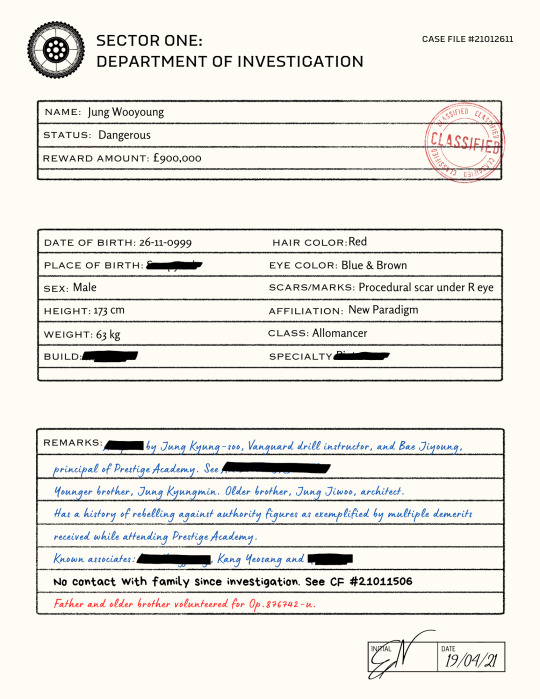

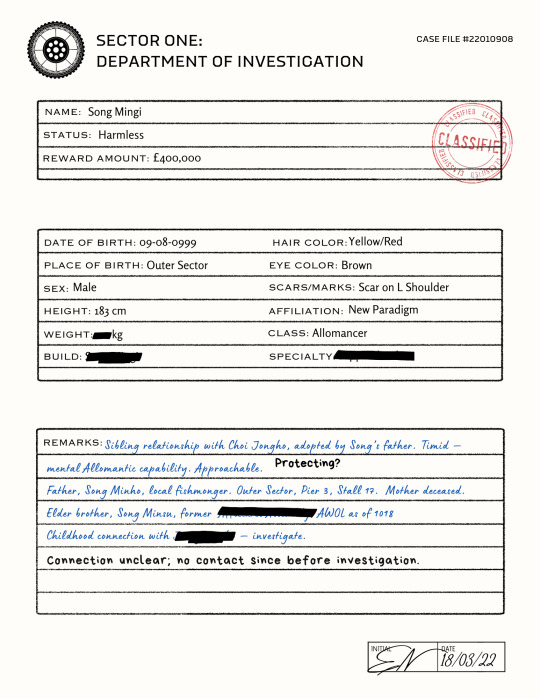
From the desk of Watch Master Luxe. View the Blue Bird dossiers here.
A cybrsoup collaboration. Release date April 19th.
45 notes
·
View notes
Text
What to read after Light Bringer? (Series similar to Red Rising)
August 2023 update!
Red Rising is my favorite series of all time, and since I first read it, I have sought series and books similar in both spirit and execution. Some of these recs are books I haven’t read personally, but have often come up in discussions with other users!
1. The Stormlight Archive by Brandon Sanderson
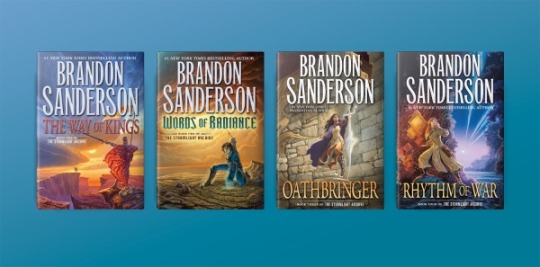
Status: ongoing, expected 10 books in total, 4/10 out at the moment
Book 1: The Way of Kings. The Way of Kings takes place on the world of Roshar, where war is constantly being waged on the Shattered Plains, and the Highprinces of Alethkar fight to avenge a king that died many moons ago.
2. The Craft Sequence by Max Gladstone

Status: finished, 6/6 books out.
Book 1 (in publication order): Three Parts Dead. Comprised of 6 standalone books set in the same universe, the Craft Sequence tells the tales of the city of Alt Coulumb. The city came out of the God Wars with one of its gods intact, Kos the Everburning. In return for the worship of his people, Kos provides heat and steam power to the citizens of Alt Coulumb; he is also the hub of a vast network of power relationships with other gods and god-like beings across the planet. Oh, and he has just died. If he isn’t revived in some form by the turn of the new moon, the city will descend into chaos and the finances of the globe will take a severe hit.
3. Hierarchy by James Islington
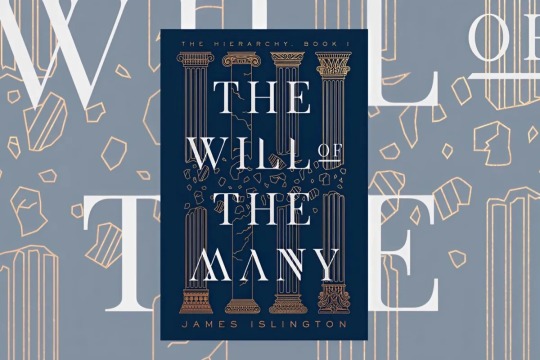
Status: ongoing, 1/3 planned books out
Book 1: The Will of the many. The Will of the Many tells the story of Vis, a young orphan who is adopted by one of the sociopolitical elites of the Hierarchy. Vis is tasked with entering a prestigious magical academy with one goal – ascend the ranks, figure out what the other major branches of the government are doing, and report back. However, that isn’t quite as easy as Vis or anyone else thought it was going to be…
4. Suneater by Christopher Ruocchio
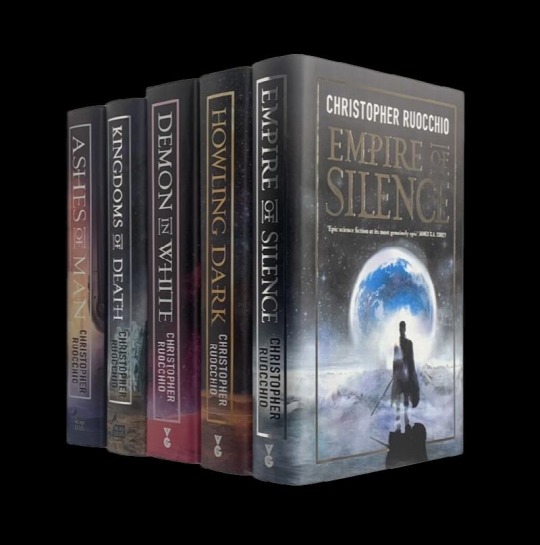
Status: ongoing, 5/7 books out
Book 1: Empire of Silence. Hadrian is a man doomed to universal infamy after ordering the destruction of a sun to commit an unforgivable act of genocide. Told as a chronicle written by an older Hadrian, Empire of Silence details his earlier adventures and serves as an introduction to the characters and the setting.
5. Dune by Frank Herbert
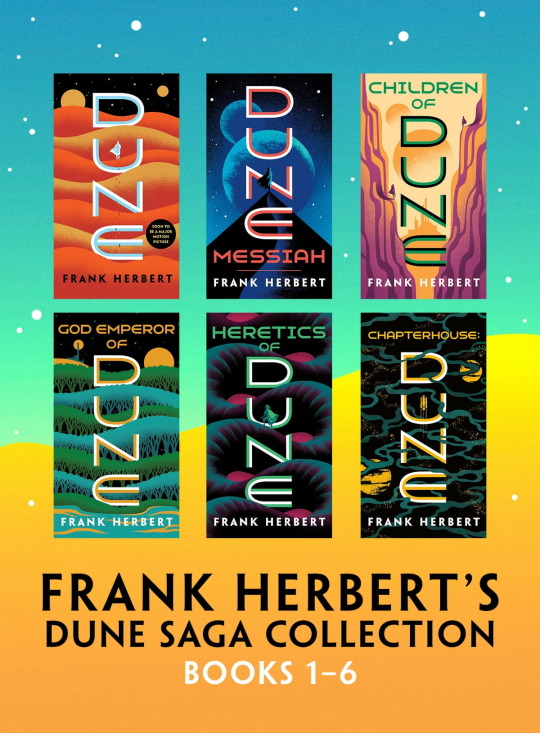
Status: completed, 6/6 books out
Book 1: Dune. Set in the distant future amidst a feudal interstellar society in which various noble houses control planetary fiefs. It tells the story of young Paul Atreides, whose family accepts the stewardship of the planet Arrakis. While the planet is an inhospitable and sparsely populated desert wasteland, it is the only source of melange, or "spice", a drug that extends life and enhances mental abilities.
6. The Expanse by James S A Corey
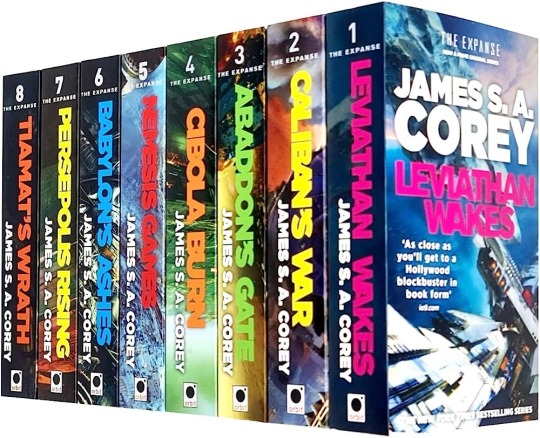
Status: completed, 9/9 books out
Book 1: Leviathan wakes. Set hundreds of years in the future, after mankind has colonized the solar system. A hardened detective and a rogue ship's captain come together for what starts as a missing young woman and evolves into a race across the solar system to expose the greatest conspiracy in human history.
7. The First Law by Joe Abercrombie
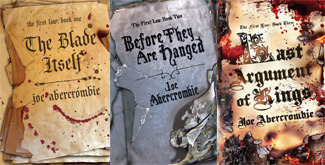
Status: completed. 3 books in the original trilogy + 3 standalone books + 3 books in the newest trilogy
Book 1: The Blade Itself. The story follows the fortunes and misfortunes of bad people who do the right thing, good people who do the wrong thing, stupid people who do the stupid thing and, well, pretty much any combination of the above. Survival is no mean feat, and at the end of the day, dumb luck might be more of an asset than any amount of planning, skill, or noble intention.
8. Cradle by Will Wight
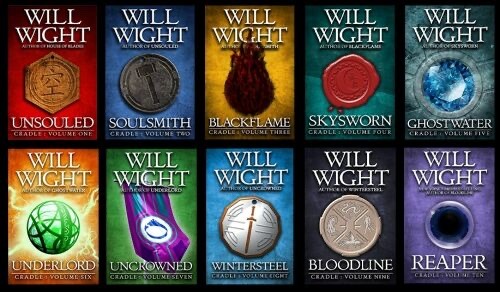
Status: completed, 12/12 books out
Book 1: Unsouled. Lindon is Unsouled, forbidden to learn the sacred arts of his clan. When faced with a looming fate he cannot ignore, he must rise beyond anything he's ever known...and forge his own Path
9. Hyperion Cantos by Dan Simmons (one PB’s favorites)
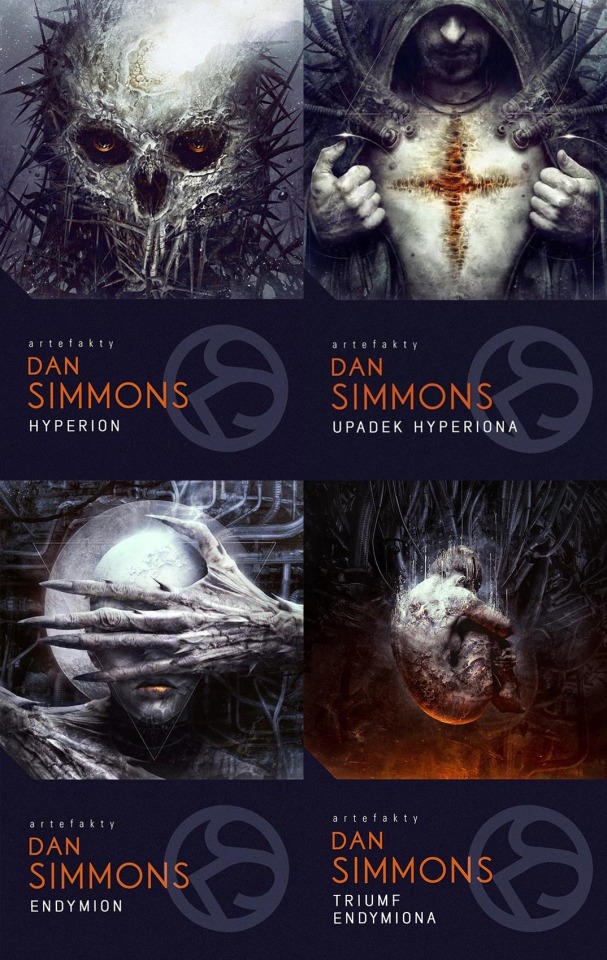
Status: completed, 4/4 books out
Book 1: Hyperion. The story weaves the interlocking tales of a diverse group of travelers sent on a pilgrimage to the Time Tombs on Hyperion. The travelers have been sent by the Church of the Final Atonement, alternately known as the Shrike Church, and the Hegemony (the government of the human star systems) to make a request of the Shrike. As they progress in their journey, each of the pilgrims tells their tale.
#red rising#golden son#morning star#pierce brown#dark age#iron gold#light bringer#what to read#book rec#book recommendation#books#stormlight archive#hyperion cantos#craft sequence#the expanse#hierarchy#the will of the many#first law#suneater#sun eater#dune#cradle series
739 notes
·
View notes
Text
What is an industry secret that you know?
- Typical_Affect8207
frostandtheboughs: All the most famous living artists have workshops full of people who make the art for them.
They spend their time choosing concepts, talking to their gallery reps and schmoozing buyers. The only time they touch the work is to sign it.
iwillfuckingbiteyou: Similarly, there's a very strong chance your favourite author uses ghostwriters. Unless your favourite is George RR Martin, whose publishers probably fucking wish he'd let them bring in ghostwriters so they could finally sell you The Winds of Winter, or JK Rowling, because if a ghostwriter turned in text so riddled with adverbs we'd be replaced with a more competent writer.
Source: Was a ghostwriter. Not a particularly high-level one, but I wrote a couple of minor bestsellers before I packed it in to languish in obscurity under my own name.
Andrew_Squared: /u/Mistborn [Brandon Sanderson] say it isn't so!
Brandon Sanderson: Ha. No, it's isn't the case for me. I don't think it's as common in writing as /u/frostandtheboughs says it is for other kinds of art. Though...I can unfortunately corroborate it does happen in fine art more than people expect. Not any of the fantasy artists I personally know, but some other artists.
I think /u/iwillfuckingbiteyou might be overstating their case. I've never known a person in f&sf to use a ghost writer--even myself, when called in to write on the Wheel of Time, was credited. They didn't need to put my name on the cover, but there was never a question if they would. Maybe it happens in thrillers or the like.
If I write a book with one of my pals, their name is on the book--and often, they do quite a bit of the work. But if my name is the only one on the book, I'm the one who wrote basically every word. (I did hire out the songs in Words of Radiance, as talked about in the front material, to have an actual poet in that seat. And editors do make suggestions that I often take, leaving their touch on the book in the shape of changed words here and there.)
I've never written a book with anyone but one of my pals, really--closest is the Legion story that we did in audio only (death and faxes) which I had very little input in, and insisted it be listed as "Brandon Sanderson's Legion" rather than with myself as an author. But even though they ignored that in some regions, it still has the other author credited as co-author. (It was pitched more as a television type deal, with an attempt at turning it into a serial run by a writer's room. Never took off.)
Anyway, no, this doesn't happen very often among the people I know and have met. Basically never. But different parts of the industry can be very different--nonfiction, for example, is a completely different world. It's full of ghostwriting. And I know in romance, pen names are very, very common, much more so than F&SF.
86 notes
·
View notes
Text
It's weird how a TV show's fanbase are these days attacking the actual authors of the books or people connected to the source material for daring to criticize the TV adaptation of story/themes/characters they are intimately familiar with.
I mean, when we as an audience can criticize a TV show for doing so and so and not making sense or mutilating characters and their arcs, surely authors who know the source material better than anyone also have a right to do so?
This happened with Brandon Sanderson when he criticized the Wheel of Time adaptation on Amazon Prime and show fanatics then went on to attack him and his writing of the WOT books. And it's now happening with GRRM calling out the HOTD adaptation on HBO.
And a lot of the times the changes in story and character are not even because of budget or time constraints and all that. It's because the showrunners/writers simply thinking they know better than the actual author of the books or that their version is better or that their favorite characters need more screentime and plot while sidelining the main characters of the books. It's their fanfiction which they get networks to finance by using the IP of popular fantasy works out there.
The reason we got only mild criticism from GRRM after GOT ended was because the books were not finished and D&D had no source material to adapt. That is not the case with HOTD and F&B.
Anyways, I don't watch HOTD after the way HBO/D&D massacred the ASoIaF books with GOT and don't intend to. The nihilism of HBO's version of this world - especially after what HBO/D&D did to the character of Daenerys Targaryen - is not for me. The world is already shitty enough for women, I don't need it in my fiction as well.
In fact I hope HBO is angry enough with GRRM that they stop consulting with him for future prequels etc. - which leaves GRRM time for finishing THE WINDS OF EFFING WINTER!! Like come on GRRM. Jon Snow has been lying dead in the snow for 13 years! Dany is still in Essos! Arya is still in Braavos! Bran has had 3 chapters in 19 years! Finish the book. That's all ASoIaF fans want at this point, IMO.
122 notes
·
View notes